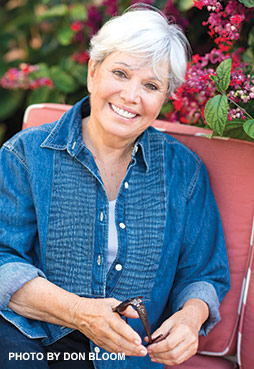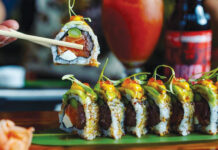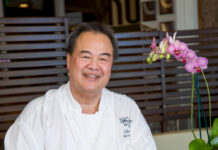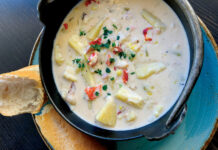Story by Becky Speere | Photos by John Giordani, Nina Kuna, Rodrigo Moraes, Becky Speere

Beverly Gannon, owner, Hāli‘imaile General Store
“Banana pudding,” says Chef Bev, “My aunts would come over to our home in Dallas for the holidays, and since my mother was raised Baptist and my dad was Jewish, we celebrated both Passover and Christmas. We had the usual turkey and ham, but we also had mandelbrot, a biscotti-like cookie, and a dark-chocolate cake about seven inches high.” But the banana pudding keeps circling into the conversation. Bev says, “I’d get a little bowl of the warm pudding from our cook, Lula Mae, just before it was placed into the refrigerator. It was divine . . . sweet and warm with Nilla Wafer cookies, banana and pudding . . . a classic preparation. As I got older, I’d write my boyfriend’s name on the top in whipped cream, or meringue. So cool.”
Colleen Brady, owner, Liliko‘i Lani Farm
“My Irish grandmother, Helen O’Shea, made oyster stew every holiday. Creamy with butter, it was extravagant — and a little strange, because we lived in the Midwest. My uncle Lawrence from Seattle sent a huge salmon for the holidays. We weren’t used to eating salmon, but soon it became a holiday staple that we loved and looked forward to. Then my kids and I moved to California and our food tradition turned Mexican. In Del Mar, we ate a rich chicken soup and tamales. After my daughters moved [into their own homes], I would buy tamales from my favorite vendor and drive up to LA so we could eat them together on Christmas Day.”
Leona Rocha Wilson, Lavina Rocha-Silva, Francis Rocha
 “Lupini beans,” Leona says. “Remember the lupini that Mom used to cook? It would take her days to prepare it over a fire in the big tin pot!” Lavina says, “I still eat them during the holidays. I used to cook them, but it takes too much time, so I just buy them in jars and have them shipped in from New York by the case.” “I still make it the old way,” says Leona, “soak the beans for a day, cook them till tender. Then I rinse the beans twice a day for four days or more, until the bitterness goes away.”
“Lupini beans,” Leona says. “Remember the lupini that Mom used to cook? It would take her days to prepare it over a fire in the big tin pot!” Lavina says, “I still eat them during the holidays. I used to cook them, but it takes too much time, so I just buy them in jars and have them shipped in from New York by the case.” “I still make it the old way,” says Leona, “soak the beans for a day, cook them till tender. Then I rinse the beans twice a day for four days or more, until the bitterness goes away.”
Lavina adds, “Our [plantation] camp was mixed with all different nationalities. We would share our [Portuguese] food with the neighbors. We loved receiving sushi in exchange.”
Perhaps this tradition was a catalyst for another cross-cultural exchange. A third Rocha sister, Pat Shishido, has a Japanese husband. Frances, their Japanese sister-in-law, is married to their brother, Leroy. Frances chimes in to say that, when she was a teenager, her job was making sushi during the holidays. Frances smiles, recalling days gone by. “I couldn’t leave the house until all the maki sushi was rolled. I still make it to give away. It’s a tradition.”





